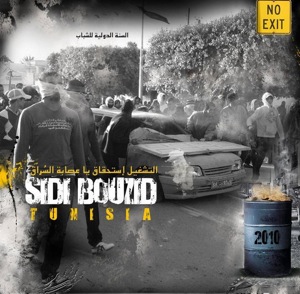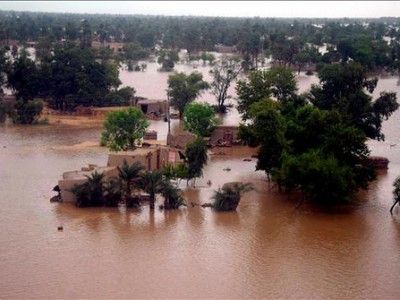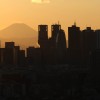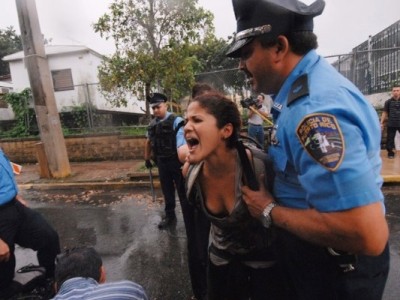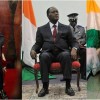Stories about Freedom of Speech from December, 2010
Russia: Internet 2010 Overview
2010 highlighted several important trends of Russian Internet. Online audience grows very fast with people getting more news online and actively using social networks. In a lot of ways, 2010 brought a recognition of the power of the Internet into Russian society.
Tunisia : “We Are Not Afraid Anymore!”
The year 2010 is coming to an end but Tunisia is shaken up by a social uprising that many bloggers hope will bring a decisive change in their country. Because of the Tunisian censorship of internet and the media, social media are heavily used to inform and organize the protests for 13 days now by using the hashtag #SidiBouzid. One main question stands out: Why are the protests in Tunisia not having the same echo as the protests in Iran? Additionally, why is censorship by China always discussed but the blackout by the police state of Tunisia never addressed?
North Korea's State-run TV Broadcasted its First Western-made Film
North Korea's state-run television broadcasted its first Western-made film, a heavily edited “Bend It Like Beckham”. The British soccer film contains North Korea's taboo topics, like interracial relationships, homosexuality and religion. British Embassy in Seoul tweeted it is ‘the first western live-action film ever aired in North Korea, arranged by...
Azerbaijan: Emin Milli's Reading list
In a note posted on Facebook, imprisoned and recently freed video blogging youth activist Emin Milli lists the books he read while in jail in Azerbaijan. Not surprisingly, the books mostly deal with a common theme — freedom and democracy.
Tunisia: Journalist Nebrass Hedhili Attacked during Uprising
Nawaat writes that journalist Nebrass Hedhili was physically abused by policemen not in uniform in the La Chebba center (fr). Nawaat also regularly updates a press review of the ongoing Sidi Bouzid uprising(fr).
Belarus: More Commentary on Dec. 19
Commentary on the implications of the post-election events in Belarus – at OpenDemocracy.net, here and here.
Hungary: “Viktor #Censorbán”
Kosmopolito writes about Hungary's new media law and suggests ways to draw attention to the situation; “transforming” PM Viktor Orbán into Viktor #Censorbán is just one of the strategies – and there's already a Censorban account on Twitter, as well as a hashtag. More relevant info and reactions – at...
Russia: Media Coverage of Khodorkovsky Verdict
Overview of media reactions to the verdict and sentence in the case of Mikhail Khodorkovsky and Platon Lebedev – by Robert Amsterdam, Global Chaos, and Sublime Oblivion.
South Asia: Looking Back at the Citizen Media Storylines in 2010
You cannot leave South Asia region out of the picture as with nearly twenty three percent of the world's population, events in this region exert an enormous impact on the international system. Global Voices covered some of these events from a citizen media perspective. Let us review the popular posts of 2010 in this region.
Tunisia: The Cry of Protestors Echoes Around the World
The cries of Tunisians, protesting against corruption and joblessness for the past two weeks, is gathering momentum on the World Wide Web. Netizens from around the world are rallying behind them and echoing their calls.
Ukrainian Blogosphere 2010: Still Enough Room for Everyone
Tetyana Bohdanova translates reports on the state of the Ukrainian blogosphere and the situation with other social media tools in Ukraine.
Taiwan: Concerns about press freedom
Media freedom has come into the spotlight in Taiwan recently. Michael Turton has a good summary of the issues. A Taipei Times reporter writes about how the proposed changes to the child welfare law would affect her work.
South Korea: Court Rules In Favor of Free Internet Speech
South Korea’s Constitutional Court has ruled that a law that bans the spreading of false information online is unconstitutional in a petition filed by a famous online blogger ‘Minerva’, who was indicted for causing disruptions in markets with his false reports. Twitterers, such as @jasmin4243[ko], bloggers, and civic groups have welcomed the ruling.
Cuba: Cables Reveal Government Sees Bloggers as “Most Serious Challenge”
Cuba was one of the Latin American countries most frequently referenced in the trove of diplomatic cables recently released by WikiLeaks. Cables confirmed much of what is already known, but they also revealed the Cuban government’s deep concern about the political impact of independent bloggers on the island.
Japan: A year of blogs
As the character 暑 (sho) meaning ‘hot or heat' was chosen to represent the year 2010 at the annual ceremony in Kyoto, let's see a selection of “hot topics” that Global Voices covered this year.
Wikileaks, Thaileaks, Indoleaks, Pinoyleaks
There are Wikileaks clones in Southeast Asia: Thaileaks from Thailand, Indoleaks from Indonesia and Pinoyleaks from the Philippines. These websites were established/revived this month to support the work started by Wikileaks and to expose secret government documents in their respective countries.
Cambodia: Jailed for printing an article from the internet
vutha doubts if there is freedom of expression in Cambodia after a UN staff member was sentenced to 6 months in prison for printing an article from a website and sharing it to his co-workers.
Russia: Author of Wildfires Internet Meme is Prosecuted by Police
A blogget top-lap, an author of a famous blog post [ENG] demanding “rynda” from Vladimir Putin and criticizing the state's response to Russian wildfires closed his blog [ENG] and disappeared. In the last posts, he wrote [RUS] that Russian police conducted a search at his home, took his computer and...
Puerto Rico: Violent Clashes at the University of Puerto Rico
Students on strike at the main campus of the state-run University of Puerto Rico were beaten and arrested last Monday, December 20, after violent clashes with the Police. Students oppose an annual $800 tuition fee that will be imposed in January. Bloggers in Puerto Rico have analyzed and commented on this recent strike and the crucial moment the student movement confronts.
Russia: Is Internet Guilty of Organizing Nationalistic Riots?
Russian media and blogosphere ponder who is responsible for the nationalists’ riots in Moscow in mid-December. But the authorities found their own scapegoat – the Internet.
Tragedy bookends Year 2010 for Francophone Citizen Media
It appears that tragedy will bookend yet another year rich in remarkable events in the world of francophone citizen media. The month of January set the tone with the fallout from the earthquake in Haiti and December saw the elections in Cote d'Ivoire take a dramatic turn. Here is the year 2010 reviewed through the lenses of francophone citizen media users.



